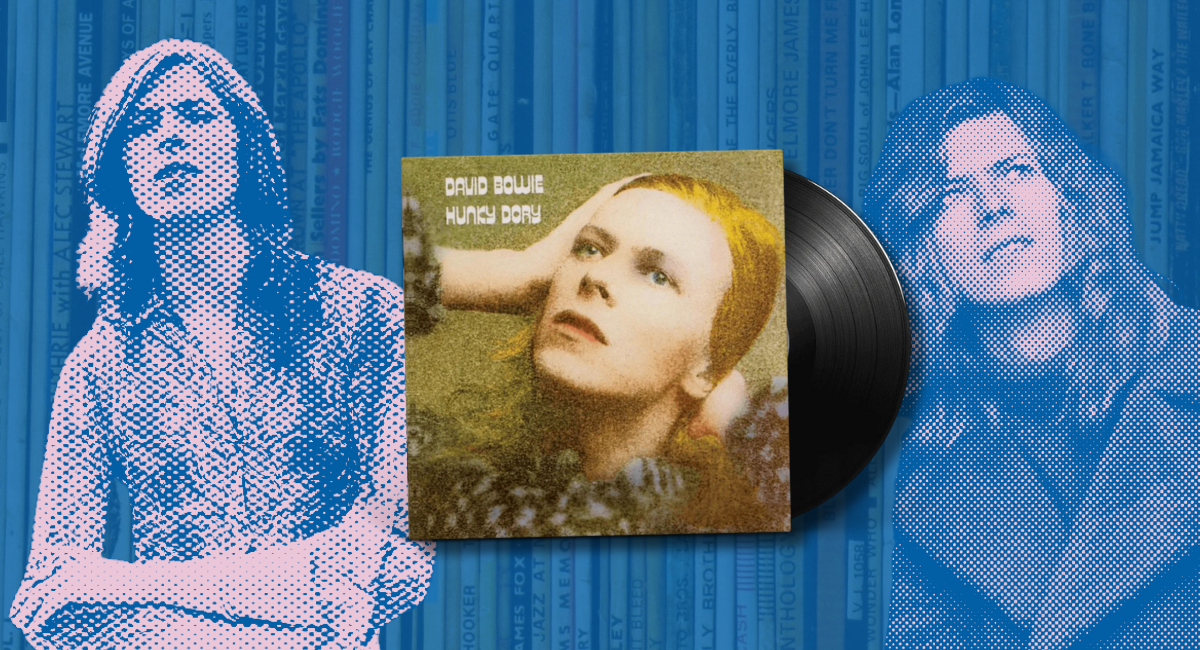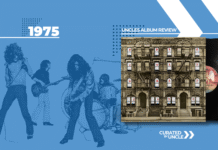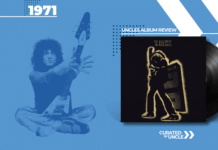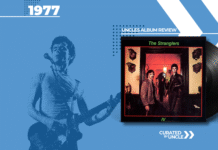Hunky Dory (1971): Bowie Before the Lightning Bolt
Let’s get something straight: before the lightning bolt, before the goblin king and before the unfortunate Tin Machine experiment (a low point even by ‘90s standards), David Bowie was just a weird bloke from Brixton with a penchant for androgyny, theatre and unnerving eye contact. Hunky Dory, released in December 1971, is the sound of Bowie flicking through identities like Tinder profiles and finally swiping right on superstardom.
It’s the album where he stops sounding like someone trying to be someone else and starts sounding like someone who might become everyone else, all at once. It’s whimsical, haunting, narcissistic and absurdly self-aware. In other words, it’s Bowie.
Table of Contents
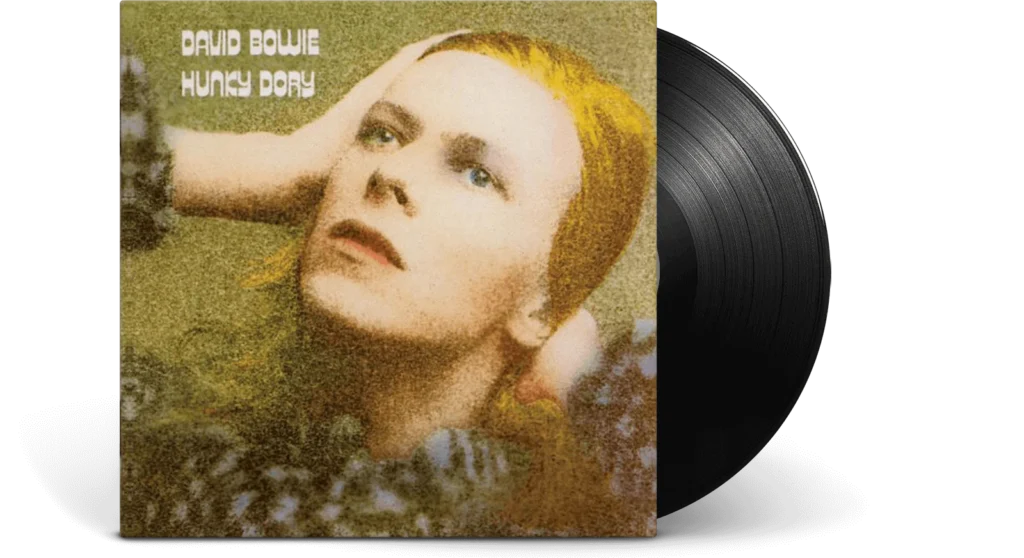
The Context: 1971 Wasn’t Ready
In 1971, the UK was knee-deep in industrial unrest, power cuts and questionable facial hair. While Led Zeppelin were busy redefining “loud,” and Marc Bolan was glam-rocking in tight trousers, Bowie was still hovering on the fringes, an oddball in eyeliner who had just sacked most of his previous bandmates. RCA had signed him, possibly during a long lunch. And with Hunky Dory, they were about to unleash an album that sounded like vaudeville on acid – if acid also made you read Nietzsche.
This wasn’t Ziggy Stardust. This was the prologue. And what a fabulous, unhinged prologue it is.
Side One: Songs for Freaks, Mothers and Meek Dictators
1. Changes
“Time may change me, but I can’t trace time.”
Translation: “I’m evolving, deal with it.”
Right off the bat, Changes announces itself with those bouncing piano chords like a clown arriving at a funeral. It’s a manifesto for reinvention and a middle finger to anyone expecting consistency. It’s self-mythology at its finest, Bowie saying “I’m a weirdo, and I’m your weirdo now.”
At the time, no one cared. Posthumously, it sounds prophetic. In 2025, it sounds like the background music to every self-help TikTok.
2. Oh! You Pretty Things
“Look out my window, what do I see? A crack in the sky and a hand reaching down to me.”
A song about super-evolved Nietzschean children overthrowing mankind, disguised as a jaunty piano ditty. You know, normal Tuesday stuff.
The beauty of this track lies in its deceptive catchiness. You’re toe-tapping to the apocalypse. Bowie plays the role of the doomsday soothsayer with the camp flourish of a West End star. If Darwin did cabaret, it’d sound like this.
3. Eight Line Poem
This song is like a haiku after three glasses of wine. Sparse, meandering, vaguely unsettling. Mick Ronson’s slide guitar moans like a ghost with trust issues. It doesn’t overstay its welcome, mainly because you forget it’s on.
4. Life on Mars?
“It’s a god-awful small affair / To the girl with the mousy hair…”
If Changes is a shrug, Life on Mars? is a punch in the soul. Equal parts absurdist cinema and tantrum, it’s arguably the best song ever written about watching crap TV and having a breakdown.
It’s also a lesson in misdirection: it begins with heartbreak and ends with a sociopolitical scream – via Sailors fighting in the dance hall. Imagine Salvador Dalí ghostwriting an episode of Coronation Street, and you’re halfway there.
Rick Wakeman’s piano glides like it’s been threatened with violence and Bowie’s vocal-piercing, theatrical and nearly hysterical cements him as not just a singer, but a presence.
5. Kooks
This is Bowie trying to be a dad. Naturally, it’s weird.
Written for his newborn son (the artist formerly known as Zowie Bowie, currently known as Duncan Jones, director of Moon), it’s part lullaby, part warning. Imagine being serenaded with lyrics like “Don’t pick fights with the bullies or the cads / ‘Cause I’m not much cop at punching other people’s dads.”
Parenting advice from a man who once tried to snort the Berlin Wall? Sure. Let’s go with that.
6. Quicksand
“I’m not a prophet or a stone age man / Just a mortal with potential of a superman.”
Bowie dives into the deep end with a philosophical face-plant. This track references Aleister Crowley, Himmler and the Golden Dawn – because why not? The instrumentation is lush and acoustic, but the lyrics read like a paranoid schizophrenic leafing through Wikipedia at 3AM.
And yet, it works. Beautifully. It’s unsettling, poetic and contains possibly the most Bowie of Bowie lines: “Knowledge comes with death’s release.” Cheery stuff.
Side Two: Art School Dropouts and Homo Superior
7. Fill Your Heart
This is where things get weird. Yes, weirder.
Originally by Biff Rose (no, really), it’s a chirpy, faux-spiritual ditty that feels like someone spiked your tea with glitter and bad decisions. Bowie belts it out with a creepy enthusiasm, as if trying to convince himself. It’s the kind of song you’d hear in a cult’s welcome video.
8. Andy Warhol
“Andy Warhol, silver screen / Can’t tell them apart at all…”
Strummed Spanish guitars and sarcastic name-dropping galore. Bowie here is both paying homage and taking the piss, which is very on-brand. You can almost hear Warhol’s passive-aggressive silence from across the art gallery.
This is the track where Bowie begins trying on the masks he’ll later wear full-time. Warhol, like Bowie, was a concept more than a man. And Bowie knew it.
9. Song for Bob Dylan
Bowie’s homage to Bob Dylan is laced with just enough passive aggression to power a small village.
He misses the old Dylan – the protest guy, the gritty folkie. So what does he do? Writes a Dylan-style song about Dylan and sings it in a parody of Dylan’s own voice. Subtle as a thrown brick. Dylan, reportedly, didn’t respond. Probably busy not giving a damn.
10. Queen Bitch
“I’m up on the eleventh floor / And I’m watching the cruisers below…”
Now we’re getting somewhere. This proto-Ziggy anthem is Bowie channelling Lou Reed and The Velvet Underground through a glam filter. It’s raw, guitar-driven and absolutely snotty. Like a leather-clad dogfight in Soho.
It’s also one of the first clear signs of Bowie embracing his queerness on record – not with hesitation, but with glee. “She’s so swishy in her satin and tat / In her frock coat and bipperty-bopperty hat.” You can’t even write lines like that sober.
11. The Bewlay Brothers
“Now my brother lays upon the rocks / He could be dead, he could be not…”
This track is… well, no one really knows. It’s Bowie’s most cryptic, gothic offering to date. Some say it’s about his half-brother Terry, others think it’s about schizophrenia. One theory posits it’s about nothing at all – just words stitched together like Frankenstein’s poetry slam.
It’s eerie, dreamlike and ends with Bowie doing a demented Cockney pub impersonation over droning harmonies. Like The Archers, if it was broadcast from a haunted asylum.
Legacy: The Album That Lit the Fuse
At the time of its release, Hunky Dory barely made a dent. It wasn’t until Ziggy kicked in Bowie’s door and demanded attention that this album started selling. In hindsight, that’s almost poetic. It’s the quiet, elegant warning before the glitter bomb exploded.
Critics eventually caught up. These days, Hunky Dory is regularly hailed as one of the greatest albums of all time. It’s a genre-defying masterpiece that manages to be funny, tragic, whimsical and horrifying – all within 41 minutes.
Cultural Impact: When the Weird Became the Blueprint
Hunky Dory didn’t just age well – it fermented into something transcendental. Though initially under appreciated, it has since become a cornerstone of pop culture, not just in music but in fashion, identity and subversion itself.
This is the album where Bowie stopped imitating and started innovating. It laid the groundwork for Ziggy Stardust, but more importantly, it gave freaks, outcasts, artists and introverts a strange, glitter-dusted gospel. Bowie didn’t just say “It’s OK to be different” – he said, “It’s fabulous to be unrecognisable.”
From the dreamy nihilism of Quicksand to the gender-bending allure of Queen Bitch, Hunky Dory challenged heteronormativity and mainstream pop conventions years before it was trendy or monetisable. Artists like Lady Gaga, St. Vincent and even Kanye West (on his more lucid days) owe part of their artistic licence to Bowie’s refusal to pick a lane.
The album has been covered, sampled and dissected in countless documentaries and academic papers. Hell, “Life on Mars?” is now played during actual Mars missions – because even the cosmos needs a soundtrack that sounds like it’s questioning its own existence.
Bowie Trivia: 5 Strange & Sparkly Facts About Hunky Dory
- Rick Wakeman Played Piano on a Budget
Before he joined prog-rock dinosaurs Yes, Rick Wakeman laid down the iconic piano tracks on Life on Mars? and Changes… for a £9 session fee. That’s barely enough for a Pret sandwich and a side-eye today. - It Wasn’t a Hit (At First)
RCA didn’t promote the album much and it barely charted. It wasn’t until Ziggy Stardust blew up that Hunky Dory was re-evaluated and treated with the reverence it now enjoys – like a cult film finally given a Criterion release. - “The Bewlay Brothers” Confuses Everyone – Even Bowie
Bowie admitted the lyrics made no real sense. “I’m not sure what it’s about,” he once said. “And I never want to know.” Possibly the most honest artistic statement ever made. - Andy Warhol Hated His Tribute Song
When Bowie played Andy Warhol for Warhol in person, the artist reportedly hated it and didn’t hide his disdain. Imagine writing a love letter to someone and watching them use it to line their hamster cage. - “Life on Mars?” Was Written Out of Spite
Bowie originally wrote English lyrics for the French song Comme d’habitude, but Paul Anka bought the rights and turned it into My Way for Sinatra. Bowie’s revenge? Writing Life on Mars?, a surrealist masterpiece far more iconic. Petty? Absolutely. Glorious? Even more so.
My Final Thoughts: A Beautiful, Bedazzled Breakdown
David Bowie’s Hunky Dory is many things: a personal diary, a collage of weird influences, a cultural mood swing and a blueprint for the gender-fluid alien superstar he was about to become.
It’s also Bowie at his most vulnerable and absurd, posing existential questions in the same breath as he sings about Warhol’s wig. If albums were people, Hunky Dory would be the androgynous art student who reads you Nietzsche in a velvet blazer, then steals your boyfriend.
This is not just music – it’s a personality disorder with a soundtrack. And it’s glorious.

If You Liked Hunky Dory, I recommend These Albums
- The Rise and Fall of Ziggy Stardust and the Spiders from Mars – David Bowie (1972)
Obvious? Yes. Essential? Also yes. This is Bowie’s glam-rock explosion, all alien messiah vibes and apocalyptic eyeliner. If Hunky Dory is the rehearsal, Ziggy is the opening night with glitter, guitars and galaxy-wide ego death. - Transformer – Lou Reed (1972)
Produced by Bowie and Mick Ronson, this is the sleazy, sardonic cousin to Hunky Dory. It struts through the gutters of New York with lipstick, junkies and poetic nihilism. Think: Queen Bitch with a dirty accent. - For the Roses – Joni Mitchell (1972)
You want introspection? Neurosis? Lyrics that feel like therapy disguised as poetry? Joni’s got you covered. While not glam, For the Roses shares Hunky Dory’s flair for vulnerability, melody and passive-aggressive genius.

Hunky Dory (2015 Remaster)
| # | Track | Duration |
|---|---|---|
| 1 |
Changes - 2015 Remaster
David Bowie
|
03:37 |
| 2 |
Oh! You Pretty Things - 2015 Remaster
David Bowie
|
03:13 |
| 3 |
Eight Line Poem - 2015 Remaster
David Bowie
|
02:55 |
| 4 |
Life on Mars? - 2015 Remaster
David Bowie
|
03:55 |
| 5 |
Kooks - 2015 Remaster
David Bowie
|
02:53 |
| 6 |
Quicksand - 2015 Remaster
David Bowie
|
05:06 |
| 7 |
Fill Your Heart - 2015 Remaster
David Bowie
|
03:10 |
| 8 |
Andy Warhol - 2015 Remaster
David Bowie
|
03:54 |
| 9 |
Song for Bob Dylan - 2015 Remaster
David Bowie
|
04:13 |
| 10 |
Queen Bitch - 2015 Remaster
David Bowie
|
03:20 |
| 11 |
The Bewlay Brothers - 2015 Remaster
David Bowie
|
05:29 |



